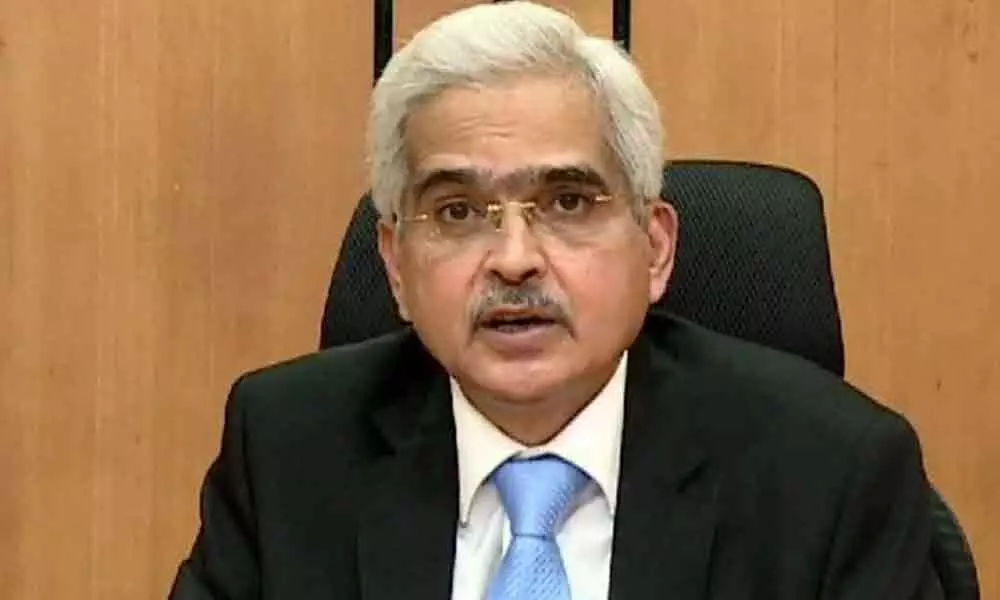Live
- Slur against Kumaraswamy wrong, Minister Zameer will be corrected: K’taka Cong
- Australian towns ordered to evacuate amid bushfire threat
- BJP backs LG's crackdown on illegal immigrants in Delhi
- AMR a global health threat, requires urgent action via one health approach: Anupriya Patel
- BJP planning big communal clash; we will expose them after Maha polls, says K’taka DyCM
- Sharad Pawar makes a soul-stirring plea 'to regain the glory of progressive Maharashtra'
- Seven soldiers killed in attack on Pak military camp in Balochistan
- ICC announces 2025 Men’s Champions Trophy tour to begin in Islamabad
- Americans increasingly vote along class lines, not racial ones: Report
- Chandrababu's brother Rammurthy Naidu Passes Away in Hyderabad
Just In
Fiscal steps key to fight Covid impact: RBI chief Shaktikanta Das


Says going beyond 3.5% of GDP target for fiscal deficit for current fiscal year 'unavoidable'
Mumbai: The Reserve Bank of India has not yet taken a view on monetising the budget deficit, which is set to surge due to the central government's ongoing fight against the Covid-19 pandemic, Governor Shaktikanta Das said. In his first interview since Prime Minister Narendra Modi announced a nationwide lockdown from March 25, Das told
Cogencis financial news agency in hour-long exclusive interview that going beyond the 3.5 per cent of GDP target for fiscal deficit for the current year has become "unavoidable".
He further underlined the need for fiscal measures to fight impact of Covid-19 on economy. "Fiscal measures are important and the government is working on a package of measures. The Finance Minister has gone on record on this. I expect that the government will take a judicious and balanced call on the question of fiscal deficit, while addressing the challenges arising from the Covid-19 pandemic," he said.
On the current situation, the central bank hasn't taken a view yet, the Governor said. "We will deal with it keeping in view the operational realities, the need to preserve the strength of the RBI's balance sheet, and most importantly, the goal of macroeconomic stability, our primary mandate." The RBI will also evaluate alternative sources of funding the fiscal deficit, Das said.
Asked if the RBI was ruling out private placements of government securities, Das said with a laugh, "I will not give a specific reply to your specific question." "My generalised response to all such questions is that all instruments, both conventional and unconventional, are on the table. I have said this before. RBI will take a judicious and balanced judgement call, depending on how the evolving situation plays out."
The Governor warned the financial market that it should not lull itself into believing that reverse repo rate, which has been cumulatively cut by 115 basis points in a span of around three weeks by the RBI, is the new signalling rate.
"I want to repeat: the repo rate is the single policy rate and it alone conveys the stance of monetary policy," he said. The lowering of reverse repo rate should be seen as a transient arrangement necessitated by the imperatives of liquidity management, he added.
On the steps to combat the impact of the pandemic, Das pointed out that it was as important to make plans for exiting the extraordinary measures that are undertaken in response to a situation. "The mantra of coming out of the 'chakravyuh' has to also be thought through very carefully and be factored in when entering the 'chakravyuh'," Das said citing the hard-to-exit battle formation from the epic Mahabharata.
"So, both (entry and exit) have to be done simultaneously. Whether it relates to fiscal deficit or liquidity or any other extraordinary measure, it has to be applied in time, and the exit also has to be made in time," he said.
The Governor also sought to allay fears that the central bank would resort to withdrawing accommodation quickly. "To ensure the markets don't read me differently and think that RBI is going on a tightening mode, let me make it very clear: the exit has to be well-timed, when you are confident that things are working and near normal.
It should not be premature. At the same time, it should not be delayed beyond a point, in the interest of all," he explaind. "We live in extraordinary times and our policy responses have to be out of the ordinary," Das said. "This is a time of trial; an endurance test. We must remain resilient and believe in our capacity to come back stronger."
On suggestion by some former central bankers that RBI should not fearing rating agencies, the RBI said that India continued to enjoy trust of foreign investors. "Irrespective of rating upgrade or downgrade, so far as India is concerned, we have seen that India has continued to enjoy the trust of foreign investors, both in terms of foreign portfolio investment and foreign direct investment," he maintained. It is the policies which a country follows, macroeconomic fundamentals and the outlook that foreign investors have on an economy that matters, he added. (Cogencis).

© 2024 Hyderabad Media House Limited/The Hans India. All rights reserved. Powered by hocalwire.com






